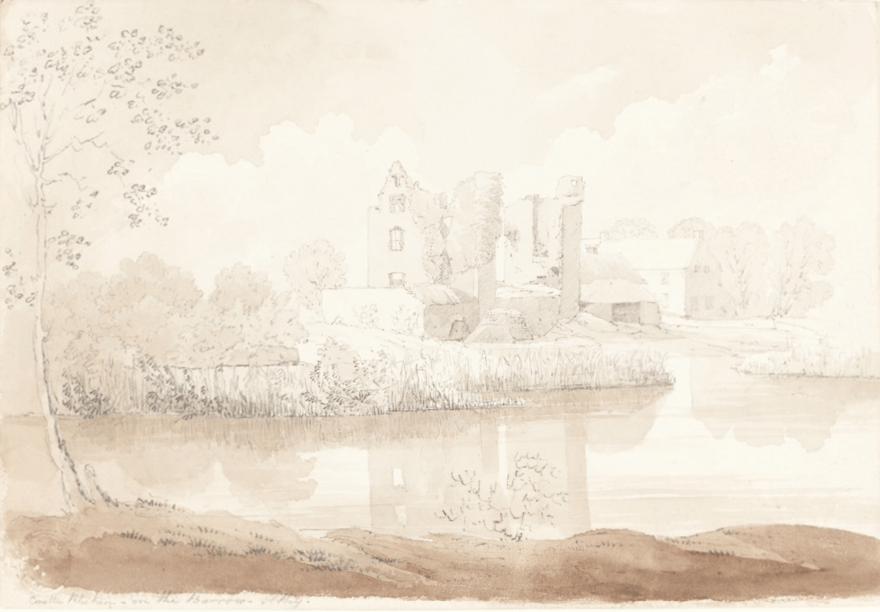Rheban Castle facts for kids
Quick facts for kids Rheban Castle |
|
|---|---|
| Native name Caisleán Réabáin | |
| Lua error in Module:Location_map at line 420: attempt to index field 'wikibase' (a nil value). | |
| Location | Castlereban North, Athy, County Kildare, Ireland |
| Built | c. 1200 |
Rheban Castle is an old stone castle found in County Kildare, Ireland. It has a long and interesting history, dating back to the 1200s. This castle has seen many important events and battles over the centuries. Today, it stands as a ruin, but it still tells a story of Ireland's past.
Contents
Where is Rheban Castle?
Rheban Castle is located about 5.4 kilometers (about 3.3 miles) northwest of Athy. You can find it on the west side of the River Barrow. To the north of the castle is the Hendy Wildlife Reserve. Across the River Barrow to the east is a place called Kilberry.
A Look Back at Rheban's History
Rheban Castle has roots that go back a very long time. Some old maps from the 2nd century AD, made by a geographer named Ptolemy, mentioned a place called Rhaiba. People used to think this was Rheban, but now some experts believe it might have been another important spot in Ireland.
Just about 1 kilometer south of the castle, you can find the remains of a much older fort. This fort is known as the Moat of Rheban. The name "Rheban" itself might come from two old Irish words: ríogh, meaning "king," and bábhún, meaning "enclosure" or "bawn." So, it could mean "the king's enclosure."
Building the Castle
After the Norman invasion of Ireland in the late 1100s, a stone castle was built here. This happened around the year 1200. A man named Richard de St. Michael, who was the baron of Reban, built it. This was during the time when King John was the Lord of Ireland. Richard de St. Michael also started a religious house nearby called Athy Priory.
Changing Hands
Over the years, Rheban Castle was owned by many different families.
- In 1325, a powerful Irish family called the Ó Mórdha (also known as the Moores) from what is now County Laois took control of the castle and the land around it.
- Later, in 1424, Rheban Castle became part of the property of Thomas FitzGerald, 7th Earl of Kildare. This happened when he married Dorothea, who was the daughter of Anthony O'More.
Raids and Battles
The castle also saw its share of raids and battles. In the 15th century, a famous warrior named Seán Ó Broin, from the Glenmalure O'Byrnes, attacked Rheban Castle. He managed to get treasure and became very famous for this raid. His bravery was even celebrated in a poem!
The castle was heavily involved in the Irish Confederate Wars, which took place from 1641 to 1650. During these wars, the castle was captured by different armies many times:
- In 1642, James Butler, Marquess of Ormond, took the castle.
- Then, in 1647, Owen Roe O'Neill captured it.
- Finally, in 1648, Murrough O'Brien, 1st Earl of Inchiquin took control.
After all these battles, the castle was left in ruins. It has remained that way ever since.
Rheban's Legacy Today
Even though Rheban Castle is a ruin, its name lives on. It gave its name to two areas nearby called the baronies of Narragh and Reban East and Narragh and Reban West. It also gave its name to the local Gaelic games club, Rheban GAA, which plays traditional Irish sports.
What Rheban Castle Looks Like
Today, Rheban Castle is a stone building with three floors. It no longer has a roof. Near the castle, there is a round, cone-shaped hill. People believe this mound might have been a tumulus, which is a burial mound built over an old Irish king or important leader.
 | Sharif Bey |
 | Hale Woodruff |
 | Richmond Barthé |
 | Purvis Young |


